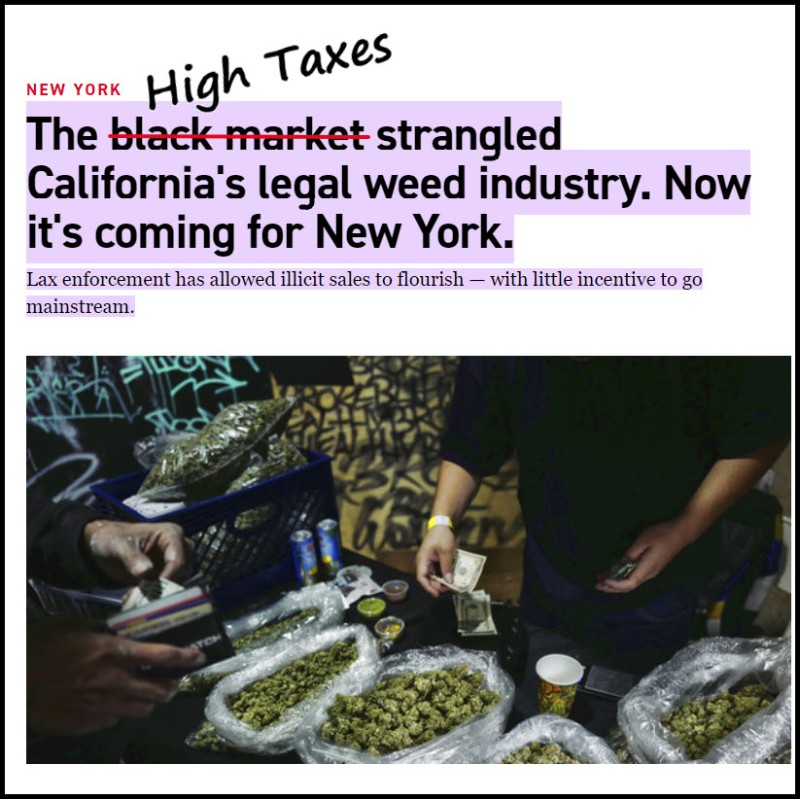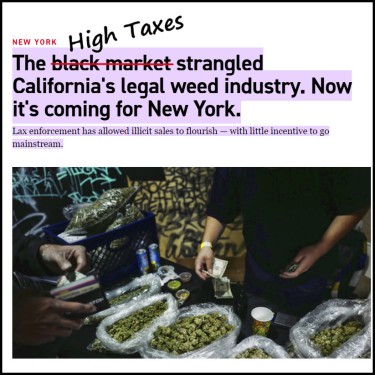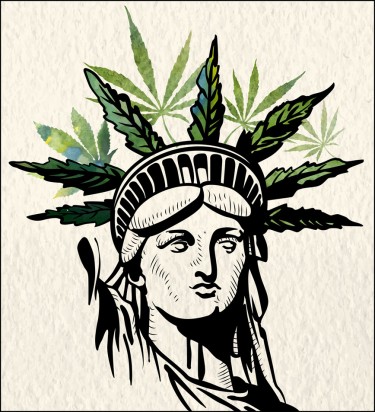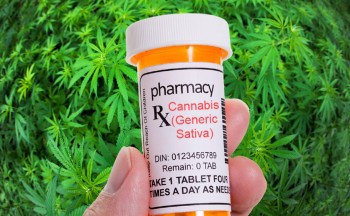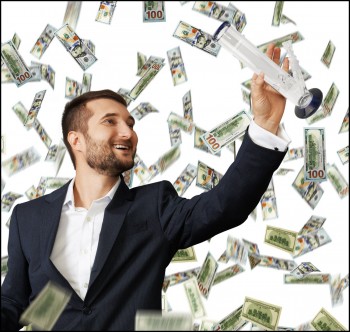Politico recently ran a headline saying "The black market strangled California's legal weed industry. Now it's coming for New York." How true is that statement? Was in the black market or high taxes that help slow down legal weed sales in California? The anwers, both, since they are one in the same. High taxes on cannabis in California, which some areas hitting 45% of the order value, has pushed people to look for cheaper alternatives to get their cannabis fix. High taxes are the black market's best friend.
As reporters JULIAN SHEN-BERRO and SHANNON YOUNG found out on their investigation...
A display case containing legal hemp and CBD is piled high inside a Brooklyn smoke shop amid rows of pipes and other paraphernalia — but a store employee does have some tips.
A reporter was silently observing the exhibit when he confided, "That's not the item you want."
Unprompted, the employee leans behind the counter and pulls out a plastic bag filled with what he claims are natural cannabis gummies imported from California, but not before carelessly remarking why the reporter looks like a cop.
He continues, "I can also sell you mushrooms."
In New York City, the scene has become a commonplace spectacle. Despite more than a year since the state legalized marijuana for adult use, not a single dispensary permit has been issued. A weed free-for-all has resulted as a result: In head stores, bodegas, and even from picnic tables on street corners, marijuana seemed to be for sale everywhere. Many vendors brag that their items were grown in California, and other dealers boldly sell in public.
This outcome is comparable to what occurred after California legalized marijuana. There are still flourishing illegal growers and vendors six years later. Despite these difficulties, New York's authorities gently dealt with anybody peddling cannabis without a license. An industry that is anticipated to create more than 20,000 new employment and a $4.2 billion industry by 2027 may now struggle to gain traction in the face of the thriving illegal market.
Some reputable businesses that were planning significant investments are already fleeing. "Everyone seems to be selling cannabis, and until there's enforcement, there's really no concern of a penalty," said Owen Martinetti, executive director of the Cannabis Association of New York. Owen is personally advocating for more civil enforcement. Suppose there is already competitiveness, and it is not enforced. In that case, it begs the question of whether [the regulated stores] are actually set up for success?
Caught off guard
Lawmakers recognized an opportunity to right historical wrongs when New York became the 15th state to enact cannabis legalization last year. They wiped specific cannabis-related criminal histories and gave justice-involved people with prior cannabis offenses first dibs on marijuana business licenses. In light of this, lawmakers resisted slapping the book on individuals presently caught peddling cannabis without a permit, issuing murky enforcement directives to the state's Office of Cannabis Management.
State Senator Liz Krueger, a sponsor of the legislation to legalize recreational cannabis, stated that since they didn't believe this was going to happen, they didn't put anything in the bill that allowed OCM and the police departments extremely clear-cut regulations of the road to close them down. Krueger argues that police already have the authority to seize illicit goods and close down violating businesses. However, fellow Democrat New York Mayor Eric Adams did not seem to agree.
A police officer cannot simply proceed with an arrest or confiscation. There is a process, he explained last month. Adams, a veteran police captain, asked New Yorkers to report illegal stores to police and stated that he plans to petition the state Legislature in January for further clarification on what the NYPD and the New York City Sheriff's Office can do.
According to City Hall spokesman Kayla Mamelak, Adams has stated unequivocally that unlawful companies will not be allowed. Local and state organizations are working closely together to ensure equity and compliance in the growing cannabis market," she announced in a statement. The Sheriff's Office of the New York City Department of Finance has undertaken hundreds of business inspections this year to guarantee compliance with all applicable regulations.
Thousands of illicit products have been recovered during such inspections, and civil and criminal penalties have been levied when warranted. We will continue to work constructively with all our partners to guarantee adherence to all legislation concerning New Yorkers' public safety.
A bill that would have tightened penalties for illegal marijuana sales and defined the OCM's role in enforcement hit a roadblock in Albany earlier this year. The measure's creation of additional criminal punishments alarmed some lawmakers.
Numerous shops that sell cannabis products without government regulation also have licenses to sell alcohol, cigarettes, and lottery tickets. Governments might suspend the permits of violating retailers, but "we have not sought to do that at all," claimed Assembly Majority Leader Crystal Peoples-Stokes.
Adams seized 19 vehicles that were selling marijuana illegally in August. The accused violation: distributing edibles and other cannabis-infused products without the necessary licenses from the city Health Department. Smaller towns in different regions of the state have closed outlets. The cannabis management office handed cease-and-desist orders to 52 retailers nationwide early this year.
Designed to fail
However, given that the first licensed stores are slated to open in the upcoming months, the recent enforcement effort could not be sufficient to mitigate the effects of the illegal market.
A medicinal and adult-use cannabis business leader with operations in New York stated, "I think we're already reaching the tipping point. This executive asked to remain anonymous because regulatory discussions are still underway. According to lawmakers, the initial round of dispensaries will have been designed to fail. The government will either need to spend more money supporting them or will see businesses returning their licenses if they don't resolve the problem before next year.
OCM spokesperson Aaron Ghitelman said that since its establishment, the organization has maintained an open line of dialogue with police departments and other government agencies across the state and is dedicated to looking into and closing down unlicensed businesses.
OCM and law enforcement officials have successfully curtailed unlawful activity across the state, from Cheektowaga town to New York City," he claimed. This operation has included product seizures, sending cease-and-desist papers, and confiscating trucks used to transport marijuana illegally. They will keep enforcing the existing rules to end these illegal shops' operations since they undercut the goals of our office and the fair market we are creating.
Further aggravating circumstances, New Yorkers are accustomed to purchasing marijuana illegally; as a result, the state must convince them to switch to regulated marijuana for the legal marijuana market to succeed.
Prices in illegal stores can be much lower. Their goods are frequently imported from countries with lower production costs, and they don't pay taxes or license fees.
If existing rates prove too onerous for legal operators, Krueger affirmed that speaking as just one sponsor of the original measure, she is open to reassessing how they tax, what formulas they use, and how they calculate it."
According to the chief knowledge officer of cannabis intelligence firm New Frontier Data, Amanda Reiman, the cannabis pipeline between California and New York is extremely ancient and very well established. California's legal sector was threatened by the illicit market there. Six years after the state's recreational marijuana legalization vote, illegal sales have considerably exceeded the authorized market, and many business owners have shut their doors.
In the most populous state in the country, the legal cannabis market has struggled due to high taxation, local government opposition, and competition from the black market. We haven't had much success in California encouraging people to embrace the controlled market, said Reiman.
In California, we haven't had much success encouraging individuals to adopt the regulated market, according to Reiman. New York can go through a honeymoon phase as customers are drawn in by the novelty of legal dispensaries. However, industry participants fear that sustained success may falter.
Conclusion
The quicker legal dispensaries are developed, the simpler it will be to tackle illegal operations. In August, Ascend Wellness withdrew a $73 million offer to buy the medical licenses of a New York company, citing, among other things, worries about the state's legalization of recreational marijuana and insufficient enforcement of the black market.
The state ought to be supporting [long-standing unlawful] operations to enter the mainstream, but instead, it's undermining trust from investors and other stakeholders,
